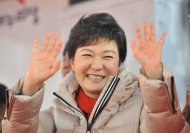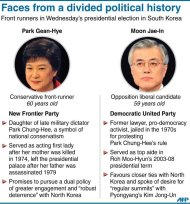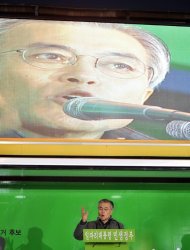If Park Geun-Hye is elected South Korea's first-ever
woman president on Wednesday, she will lead a country that is ranked
below the likes of Suriname and the United Arab Emirates in gender
equality.
South Korea's journey from war-torn poverty to Asia's fourth-largest
economy has done little to break the male stranglehold on political and
commercial power in what in many ways remains a very conservative
nation.Women occupy a mere 15 percent of seats in parliament and, in the private sector, only 12 percent of managerial positions at 1,500 major firms. They also earn nearly 40 percent less than men -- the biggest pay gap among the Organisation for Economic Co-operation and Development group of nations.
Against this bleak backdrop, Park and her supporters claim her elevation to the presidential Blue House would pave the way for greater rights for women in general.
"Everyone keeps talking about change and reform... but electing the country's first female president will be the biggest change and political reform we ever achieve," Park told a group of women leaders.
"You can't achieve the revolution for women unless you seize on this opportunity. Let's make this happen," the 60-year-old said.
Her ruling New Frontier Party (NFP) has touted her as "The Prepared Female President" -- a slogan driven home in almost all her campaign posters and speeches.
"There will be no more significant progress in our constitutional history and democracy than having the first female president," one party spokesman told AFP.
But not all are convinced by the image of Park as a model for the country's 24 million women, with critics arguing that her popularity largely derives from the legacy of her father, the late military strongman Park Chung-Hee.
Park Geun-Hye never married and has long been an object of sympathy from older conservative voters who view her as something of an ill-fated princess who lost both parents to assassination but managed to rise above the tragedy.
Kim Eun-Ju, executive director of the Centre for Korean Women and Politics, believes Park is a female political leader "only in biological terms".
"For the past 15 years, Park has shown little visible effort to help women in politics or anywhere else as a policymaker," Kim told AFP.
Park's own party has a notably poor record on women's issues and is better known for the sexist gaffes of its male members.
Lee Jae-Oh, a party heavyweight who challenged Park for the presidential nomination, once called women unfit to govern because they were excused the two-year military service that is mandatory for all South Korean men.
Another NFP lawmaker was sacked from the party in 2010 for suggesting female TV broadcasters should offer sex to advance their careers.
In her campaign, Park has promised to boost financial aid for childcare, offer incentives for firms to hire women and require political parties to reserve 40 percent of election candidate nominations for women.
But some prominent South Korean women such as Kang Kum-Sil, the country's first female justice minister from 2003-04, question Park's sudden play for female voters after a decade of remaining largely silent about their causes.
"How shameless of Park... Being a woman is not a tool you can use in a rushed attempt to win more votes," Kang said.
Earlier this year, the World Economic Forum ranked South Korea 108th out of 135 countries it surveyed in terms of gender equality, one place below the United Arab Emirates and just above Kuwait.
It scored particularly low in terms of women's access to economic participation with a ranking of 116.
Kim Eun-Ju is unconvinced that a top-down change would necessarily follow the election of a female president.
"Perhaps having a woman at the top of the government may change attitudes of senior public servants who are mostly male and conservative," Kim said.
"But first we have to see if she really can be elected to president in a country like this," she added.
More about the story
- Is South Korea ready for "Madam President"?
- No-hoper steals S. Korean presidential debate
- Far-left candidate quits South Korea poll, boosts opposition
- Far left outsider "winner" in Korean presidential debate
- Last S.Korea polls give conservative Park the edge
- Voters in 30s, Seoul area rise as key swing electorate
- North Korea a looming problem for whoever wins South vote




ไม่มีความคิดเห็น:
แสดงความคิดเห็น